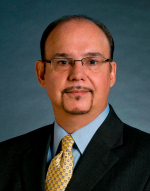On this World AIDS day, Miami-Dade County leads the nation in new HIV infections. Only 65 percent of those infected receive regular medical care, and one HIV-positive person can potentially infect more than 1,000 people in three years if undiagnosed or untreated.
To combat this alarming trend, Miami-Dade County officials created the Getting to Zero Task Force charged with developing a comprehensive approach and action plan. Dr. Tomás Guilarte, dean of the Robert Stempel College of Public Health & Social Work, has been appointed to the task force.
 A leading scientist, educator and academic leader, Guilarte’s research has focused on mechanism-based neurotoxicology and neuroscience. He has published on brain inflammation in individuals infected with HIV.“The factors that are driving our high rate of new infections –including poverty, stigma, discrimination and substance use– are challenging and new public health measures in prevention and treatment are needed,” Guilarte says. “At the college, we are working to identify effective ways to prevent new HIV cases and provide better care to those who have HIV infection.”
A leading scientist, educator and academic leader, Guilarte’s research has focused on mechanism-based neurotoxicology and neuroscience. He has published on brain inflammation in individuals infected with HIV.“The factors that are driving our high rate of new infections –including poverty, stigma, discrimination and substance use– are challenging and new public health measures in prevention and treatment are needed,” Guilarte says. “At the college, we are working to identify effective ways to prevent new HIV cases and provide better care to those who have HIV infection.”
In a letter appointing Guilarte to the task force –a collaboration of the Office of the Mayor of Miami-Dade County, the Miami-Dade HIV/AIDS Partnership and the Florida Department of Health in Miami-Dade – Mayor Carlos Gimenez and fellow officials wrote:
“Your leadership and statue in the community are critical to helping to reinvigorate the focus and attention needed to end new HIV infections and AIDS diagnosis.”
The task force will tap into all the college’s resources, which includes $7 million in funding for HIV/AIDS research. Faculty members will also serve on several working committees.
Dr. Mary Jo Trepka, professor in the Department of Epidemiology, will serve on the Care and Treatment Committee, developing recommendations that will maximize access to care and improve quality of care.
Professor Marion De la Rosa, director of the Center for Substance Use and AIDS Research on Latinos in the United States (CRUSADA), will sit on the Social and Support Services Committee. Along with his colleagues, De la Rosa will examine the impact of stigma, low health literacy, housing availability, transportation, addiction issues and unemployment on long-term HIV/AIDS health outcomes.
On the Systems and Policy Committee, Bill Darrow –professor and member of the CDC task force that investigated the cause of a mysterious and deadly outbreak of AIDS in the summer of 1981 –will help develop recommendations for innovative HIV/AIDS social policies.

